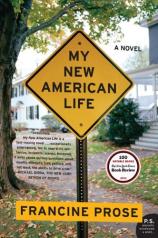My New American Life
Review
My New American Life
Temporarily submerged by our economic woes, the debate over immigration policy simmers just below the surface of American political and social life. In her lighthearted, consistently engaging new novel, Francine Prose tells the story of Lula, a savvy 26-year-old Albanian newcomer trying to gain a foothold in a country that at times seems as strange as her bizarre native land.
It's October 2005, a low point of the Bush presidency, with others as yet unimagined, ahead. Half-Muslim, half-Christian Lula has just secured her work permit, a glimpse of her green card glittering on the horizon. She's situated uneasily in a sterile New Jersey McMansion 10 miles from Manhattan. Its owner, Stanley Larch ("Mister Stanley" to Lula), is a former economics professor turned disgruntled Wall Street banker. He's hired her to keep an eye on Zeke, his sullen, vampire-obsessed teenage son whose taste in attire runs to black and body piercings. Their wife and mother, Ginger, abandoned the family for the Norwegian fjords ("she wanted to start over, somewhere clean and white") the previous Christmas Eve, suffering from something her husband vaguely describes as "mental health issues." Hearing what sounds like sobbing from Mister Stanley's room one night, she wonders, "Who wouldn't cry? No wife, no fun, no girlfriends, a job he hated, a son who seemed to despise him."
Out of boredom, Lula turns to writing stories based on Albanian folk legends she reshapes into magical realist-inflected tales about her family's life that Mister Stanley naively believes demonstrate real literary talent. But Lula's quotidian existence is disrupted when three young Albanian men she nicknames the "Cute One," "Hoodie" and "Leather Jacket," appear at the Larch residence in a black Lexus SUV. She's attracted to Alvo ("the Cute One") who has been in the country since 1990 and claims vaguely to be working "renovating supermarkets." Her feelings oscillate between desire for him and the sense she's dealing with a character whose danger hasn't yet fully revealed itself. Though Alvo and his companions inject a note of menace into the story, it never rises to a level where we fear any serious harm will befall Prose's likable characters. The one scene of near violence, involving Lula, Alvo and the hapless Ginger Larch, is played mostly for comic effect.
Mister Stanley's good friend and Lula's attorney is Don Settebello, an immigration lawyer who blends a highly successful practice with an idealistic streak that has him representing Guantanamo detainees, bitterly complaining all the while of their mistreatment. He's the voice of what Prose suggests is the fading American conscience, suppressed by lingering fears of terrorist attacks, real or imagined.
Contrasted with Lula's life is the one her Albanian comrade Dunia has fashioned on American soil. Lula discovers her that friend hasn't been kidnapped and sold into Asian sex slavery, as she had feared. Instead, she has landed herself a husband (a New Jersey plastic surgeon named Steve) and has settled with alacrity into the role of the jaded suburban housewife ("It's like living under Communism. The shopping is better. The sex is worse."). Their trip to the Short Hills Mall to outfit Lula for a Christmas Eve date with Alvo is a sharp send-up of American consumerism. Prose's satiric gifts are put to equally fine use in her portrayal of the obligatory upper middle-class parent/child college tour and in the scenes of Lula's encounter with the more Dickensian aspects of our criminal justice system.
Some of the purest pleasures of Prose's novel are Lula's sharp insights into our contemporary life. "But America was like Communism and post-Communism combined," she remarks. "You weren't supposed to be materialistic until you got successful, after which it was practically your duty to flaunt it in everyone's face." Commenting on the contrast between a Congressman confessing an adulterous affair and the president denying reports of torture in Iraq, she notes, "It was interesting how everyone lied and only the adulterers got caught." With her sly wit, Prose holds a mirror up to both our shortcomings and our occasionally endearing oddities, giving us an opportunity to see ourselves with fresh, unblinking eyes.
Prose's novel is anything but the classic immigrant saga. But what unites Lula's story with those is her ample tool kit of survival skills, her determination to succeed in her adopted homeland, and her optimism that tomorrow and the day after that will be better than today. Those personality traits make her an appealing protagonist and her story one of unalloyed enjoyment.
Reviewed by Harvey Freedenberg (mwn52@aol.com) on May 16, 2011
My New American Life
- Publication Date: May 8, 2012
- Genres: Fiction
- Paperback: 336 pages
- Publisher: Harper Perennial
- ISBN-10: 0061713791
- ISBN-13: 9780061713798





